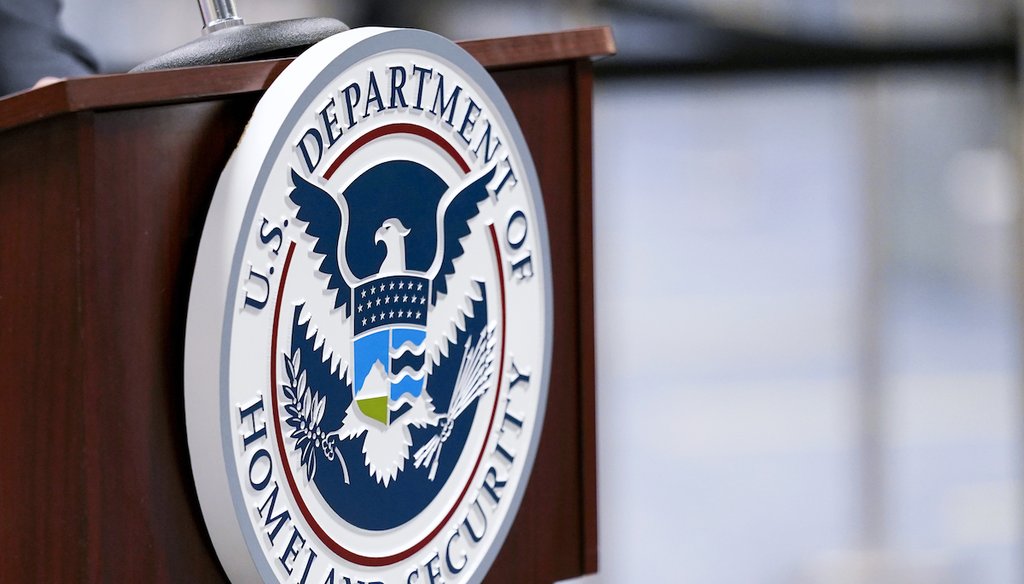Stand up for the facts!
Our only agenda is to publish the truth so you can be an informed participant in democracy.
We need your help.
I would like to contribute

A U.S. Department of Homeland Security plaque is displayed a podium as international passengers arrive at Miami international Airport where they are screened by U.S. Customs and Border Protection, Nov. 20, 2020, in Miami. (AP)
If Your Time is short
-
Customs and Border Protection does not publicly release data on “special interest aliens.”
-
Immigration experts said the “special interest alien” designation is primarily about a person’s country of origin, not based on an individualized assessment of a person’s history or network of friends and family, for example.
-
In 2019, the Department of Homeland Security said that not all people designated special interest aliens are terrorists and that the designation “does not indicate any specific derogatory information about the individual.”
Illegal immigration is a frequent focus on Laura Ingraham’s Fox News show "The Ingraham Angle," and one of the show’s contributors recently offered data that he claimed showed the safety risks behind it.
"People underestimate the danger of this, Laura," Raymond Arroyo said Sept. 6. He claimed that U.S. Immigration and Customs Enforcement "just arrested" more than 300 migrants with criminal records "and 75,000 illegals have now been named national security threats by Border Patrol."
We wondered about Arroyo’s source for the number of people deemed national security threats, so PolitiFact reached out to Fox News. A spokesperson there said Arroyo’s claim was based on an article published in the Daily Caller, a right-wing online publication.
"Customs and Border Protection (CBP) flagged 74,904 illegal migrants nationwide for potentially posing risks to national security between October 2022 and August, according to CBP data obtained exclusively by the Daily Caller News Foundation," read a quote the spokesperson pulled from the report.
The bulk of the article then focused on "special interest aliens." It cited a Department of Homeland Security 2019 fact sheet that defined a special interest alien as "a non-U.S. person who, based on an analysis of travel patterns, potentially poses a national security risk to the United States or its interests."
The Daily Caller article also said Border Patrol agents in fiscal year 2022 "encountered 25,627 'special interest' illegal migrants" and 3,675 in fiscal year 2021; its source is "internal agency data previously obtained by the DCNF."
We asked CBP about the Daily Caller’s numbers, but did not hear back. We also did not find publicly available data on the number of "special interest aliens." Experts told us government agencies have used that term differently, too, muddying the issue.
Here’s what we found.
Across federal agencies, there is no universally accepted definition for "special interest alien" and immigration experts say the definition has changed over time.
The 2019 DHS fact sheet cited in the article published by the Daily Caller said that not all special interest aliens are terrorists, but that their travel and behavior "indicates a possible nexus to nefarious activity (including terrorism) and, at a minimum, provides indicators that necessitate heightened screening and further investigation."
DHS also said a special interest alien designation "does not indicate any specific derogatory information about the individual" and that it’s different from the "known and suspected terrorist" designation.
DHS says a "known terrorist" is a person who has been arrested, charged or convicted for crimes related to terrorism or someone who has been identified as a terrorist or member of a terrorist organization.
Meanwhile, a "suspected terrorist," according to DHS, is a person "reasonably suspected" to have engaged in, be engaged in or intending to engage in terrorist activity.
During a 2016 House hearing about potential terrorist threats, then-Rep. Albio Sires, D-N.J., asked government officials: "Can you define for me or discuss how the U.S. government defines special interest aliens? How do you do that?"
Alan D. Bersin, DHS’ assistant secretary for international affairs and chief diplomatic officer, said the "special interest alien" definition varies by agency. "They tend to be either a listing of countries. I have seen listings up to 35 countries. Other agencies take up a more restricted terrorist-related or a terrorist-centric view of the definition."
Lev Kubiak, assistant director for international operations at Immigration and Customs Enforcement, said his agency was "trying to get away" from using the special interest aliens classification because it lacks a standard definition.
Experts said the special interest alien classification is primarily about a person’s country of origin, and is not based on an individualized assessment of a person’s history or network of friends and family, for example.
"The definition of which countries make a person a special interest alien changes constantly," said David Bier, the libertarian Cato Institute’s associate director of immigration studies.
In 2016, the list of "special interest countries" was about 35 countries long, including countries deemed state sponsors of terrorism — at the time, Iran, Syria and Sudan — and countries such as Afghanistan, Somalia, Bangladesh, Egypt, Iraq and Pakistan, the Texas Tribune reported.
In October 2018, the Trump White House referred to a list of 22 countries as "‘special interest aliens’ countries."
The recent increase in the number of migrants arriving "from outside the Western Hemisphere" might be boosting the number of people deemed special interest aliens, said Aaron Reichlin-Melnick, policy director at the American Immigration Council, an immigrants' rights advocacy group.
"We’ve even seen hundreds of Afghan nationals fleeing the Taliban come to the United States to seek asylum," Reichlin-Melnick said. Based on what is known about the United States’ lists of special interest countries, it is likely that those immigrants from Afghanistan and thousands of immigrants from Bangladesh who have recently come to the United States "would be considered special interest aliens," he said.
Reichlin-Melnick said it’s important for people to understand that the designation doesn’t mean a person is a national security threat.
"It just generally means that they come from a country that the U.S. is concerned with, not that they themselves represent a threat," he said.
There's no evidence a person apprehended by Border Patrol who was designated a "special interest alien" has ever committed an attack on U.S. soil, according to Sept. 14 testimony from the Cato Institute’s vice president for economic and social policy studies Alex Nowrasteh.
Our Sources
Email interview with Aaron Reichlin-Melnick, Policy Director at the American Immigration Council, Sept. 8, 2023
Email statement from David Bier, associate director of immigration studies at the Cato Institute, Sept. 11, 2023
Email exchange with Michelle Mittelstadt, director of communications and public affairs at the Migration Policy Institute, Sept. 8, 2023
Internet Archive, "The Ingraham Angle," Fox News Sept. 7, 2023, 1 a.m.-2 a.m. PDT, accessed Sept. 7, 2023
The Daily Caller, EXCLUSIVE: Feds Flagged Nearly 75,000 Illegal Migrants As Potential National Security Risks, Sept. 1, 2023
Department of Homeland Security, MYTH/FACT: Known and Suspected Terrorists/Special Interest Aliens, Jan. 7, 2019
RaymondArroyo.com, Raymond’s Bio, accessed Sept. 7, 2023
Email exchange with Fox News spokesperson, Sept. 8, 2023
Cato Institute, 45,000 "Special Interest Aliens" Caught Since 2007, But No U.S. Terrorist Attacks from Illegal Border Crossers, Dec. 17, 2018
U.S. Government Publishing Office, Potential terrorist threats: Border security challenges in Latin America and the Caribbean, March 22, 2016
U.S. Department of Commerce National Technical Reports Library, U.S. Response to Special Interest Aliens, a Collaborative Effort, March 15, 2008
U.S. Customs and Border Protection, Del Rio Sector Announces New Deputy Chief Patrol Agent, Oct. 3, 2019
U.S. Department of Homeland Security, Written testimony of PLCY Office of International Affairs Assistant Secretary and Chief Diplomatic Officer Alan Bersin for a House Committee on Foreign Affairs, Subcommittee on the Western Hemisphere hearing titled "Potential Terrorist Threats: Border Security Challenges in Latin America and the Caribbean," March 22, 2016
U.S. Department of Homeland Security, David V. Aguilar’s memorandum: Arrests of aliens from special interest countries, Nov. 1, 2023
ABC News, Fact Check: State Department says 'no credible evidence' terrorists entering through southern border, Jan. 8, 2019
The Texas Tribune, Risk of terrorists crossing U.S. border into Texas is real — but low, Dec. 1, 2016
U.S. Customs and Border Protection, Nationwide Encounters, accessed Sept. 12, 2023
Cato Institute, Terrorism and Immigration, Aug. 22, 2023
C-SPAN, Washington Journal Alex Nowrasteh on 'Special Interest Aliens" and Border Security, Jan. 14, 2019
Jake Tapper post on X, Oct. 22, 2018
House Committee on the Judiciary on YouTube, Terrorist Entry Through the Southwest Border, Sept. 14, 2023
PolitiFact, VP Mike Pence says government nabbing 7 terrorists or suspected terrorists a day on southern border, Feb. 21, 2018
PolitiFact, How many terrorists have attempted to cross the southern border? Data is limited and imprecise, March 22, 2021






























